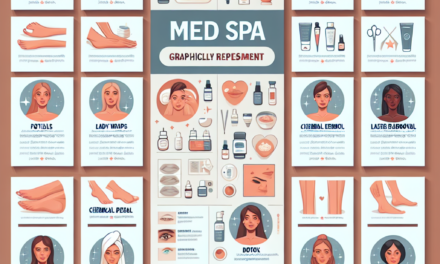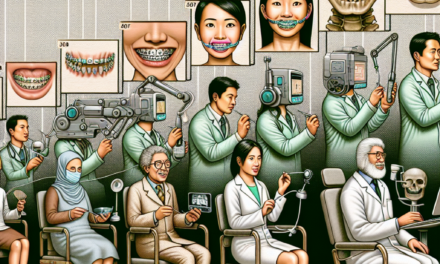Transforming Healthcare: The Impact of AI on Digital Innovation
The healthcare industry is undergoing a significant transformation, driven by the rapid advancement of artificial intelligence (AI) and digital innovation. As healthcare systems worldwide grapple with increasing patient demands, rising costs, and the need for improved outcomes, AI emerges as a powerful tool that can enhance efficiency, accuracy, and accessibility. This article explores the multifaceted impact of AI on healthcare, focusing on five key areas: diagnostics and treatment, patient engagement, operational efficiency, data management, and ethical considerations. Each section delves into how AI is reshaping these aspects of healthcare, supported by relevant examples, case studies, and statistics.
1. AI in Diagnostics and Treatment
One of the most promising applications of AI in healthcare is in diagnostics and treatment. AI algorithms can analyze vast amounts of medical data, including images, lab results, and patient histories, to assist healthcare professionals in making more accurate diagnoses and treatment plans.
1.1 Enhancing Diagnostic Accuracy
AI technologies, particularly machine learning and deep learning, have shown remarkable capabilities in interpreting medical images. For instance, studies have demonstrated that AI can outperform human radiologists in detecting certain conditions, such as breast cancer in mammograms. A study published in the journal *Nature* found that an AI system developed by Google Health reduced false positives by 5.7% and false negatives by 9.4% compared to human radiologists.
- Image Analysis: AI algorithms can analyze X-rays, MRIs, and CT scans with high precision, identifying anomalies that may be missed by the human eye.
- Pathology: AI can assist pathologists in diagnosing diseases by analyzing tissue samples, leading to faster and more accurate results.
- Genomics: AI is being used to interpret genetic data, helping to identify mutations linked to specific diseases and tailoring personalized treatment plans.
1.2 Personalized Medicine
AI’s ability to analyze large datasets enables the development of personalized medicine, where treatments are tailored to individual patients based on their genetic makeup, lifestyle, and environmental factors. For example, IBM’s Watson for Oncology uses AI to analyze patient data and recommend treatment options based on the latest research and clinical guidelines.
By leveraging AI, healthcare providers can offer more effective treatments, reduce adverse drug reactions, and improve patient outcomes. A study published in the *Journal of Personalized Medicine* found that AI-driven personalized treatment plans led to a 30% increase in treatment efficacy for cancer patients.
1.3 Case Study: AI in Radiology
One notable case study is the implementation of AI in radiology at the University of California, San Francisco (UCSF). The institution integrated an AI system that analyzes chest X-rays to assist radiologists in identifying conditions such as pneumonia and lung cancer. The AI system was trained on a dataset of over 1 million images, allowing it to learn patterns associated with various diseases.
After implementation, UCSF reported a significant reduction in diagnostic errors and improved turnaround times for radiology reports. The AI system not only enhanced the accuracy of diagnoses but also allowed radiologists to focus on more complex cases, ultimately improving patient care.
2. AI and Patient Engagement
Patient engagement is crucial for improving health outcomes and ensuring that patients adhere to treatment plans. AI technologies are transforming how healthcare providers interact with patients, making it easier for them to access information, communicate with providers, and manage their health.
2.1 Virtual Health Assistants
AI-powered virtual health assistants, such as chatbots and voice-activated devices, are becoming increasingly popular in healthcare. These tools can provide patients with instant access to information about their health conditions, medication reminders, and appointment scheduling.
- 24/7 Availability: Virtual assistants are available around the clock, allowing patients to seek information and support at any time.
- Personalized Interactions: AI can analyze patient data to provide tailored responses and recommendations based on individual health needs.
- Reducing Administrative Burden: By handling routine inquiries, virtual assistants free up healthcare staff to focus on more complex patient needs.
2.2 Telemedicine and Remote Monitoring
The COVID-19 pandemic accelerated the adoption of telemedicine, and AI plays a vital role in enhancing these services. AI algorithms can analyze data from wearable devices and remote monitoring tools to provide real-time insights into a patient’s health status.
For example, AI can monitor vital signs such as heart rate and blood pressure, alerting healthcare providers to any concerning changes. This proactive approach allows for timely interventions and reduces the need for in-person visits, improving patient convenience and access to care.
2.3 Case Study: AI in Telehealth
A compelling case study is the use of AI in telehealth services by the health technology company Amwell. Amwell’s platform integrates AI algorithms to triage patients based on their symptoms and direct them to the appropriate care provider. The system analyzes patient data and provides recommendations for treatment options, streamlining the telehealth experience.
During the pandemic, Amwell reported a significant increase in telehealth visits, with AI playing a crucial role in managing patient flow and ensuring timely care. The integration of AI not only improved patient satisfaction but also enhanced the overall efficiency of the telehealth service.
3. Operational Efficiency through AI
Operational efficiency is essential for healthcare organizations to deliver high-quality care while managing costs. AI technologies are being leveraged to optimize various operational processes, from scheduling appointments to managing supply chains.
3.1 Predictive Analytics for Resource Management
AI-driven predictive analytics can help healthcare organizations forecast patient demand, enabling them to allocate resources more effectively. By analyzing historical data, AI algorithms can predict patient volumes, identify peak times, and optimize staffing levels accordingly.
- Emergency Room Management: AI can predict patient arrivals in emergency departments, allowing hospitals to prepare for surges in demand.
- Surgical Scheduling: AI can optimize surgical schedules by analyzing patient data and predicting the duration of procedures.
- Supply Chain Optimization: AI can forecast inventory needs, reducing waste and ensuring that essential supplies are available when needed.
3.2 Automating Administrative Tasks
Administrative tasks, such as billing and coding, can be time-consuming and prone to errors. AI technologies can automate these processes, reducing the administrative burden on healthcare staff and improving accuracy.
For instance, AI-powered coding systems can analyze clinical documentation and automatically assign the appropriate codes for billing purposes. This not only speeds up the billing process but also minimizes the risk of claim denials due to coding errors.
3.3 Case Study: AI in Hospital Operations
The University of Pennsylvania Health System implemented an AI-driven platform to optimize its hospital operations. The system analyzes data from various sources, including electronic health records and patient flow metrics, to provide real-time insights into operational efficiency.
As a result of this implementation, the health system reported a 20% reduction in patient wait times and improved bed utilization rates. The AI platform enabled staff to make data-driven decisions, ultimately enhancing the overall patient experience.
4. Data Management and Security
Data management is a critical aspect of healthcare, as organizations must handle vast amounts of sensitive patient information. AI technologies are being utilized to improve data management practices while ensuring the security and privacy of patient data.
4.1 Enhancing Data Analytics
AI can analyze large datasets quickly and efficiently, uncovering valuable insights that can inform clinical decision-making and improve patient outcomes. Machine learning algorithms can identify patterns and trends in patient data, enabling healthcare providers to make evidence-based decisions.
- Clinical Decision Support: AI can provide real-time recommendations to clinicians based on patient data and the latest research.
- Population Health Management: AI can analyze data from diverse populations to identify health disparities and inform targeted interventions.
- Predictive Modeling: AI can predict patient outcomes based on historical data, helping providers to intervene proactively.
4.2 Ensuring Data Security
As healthcare organizations increasingly rely on digital technologies, ensuring the security of patient data is paramount. AI can enhance data security by detecting anomalies and potential breaches in real-time.
For example, AI algorithms can monitor network traffic and identify unusual patterns that may indicate a cyberattack. By implementing AI-driven security measures, healthcare organizations can protect sensitive patient information and comply with regulations such as HIPAA.
4.3 Case Study: AI in Data Security
The healthcare provider Anthem implemented an AI-driven cybersecurity solution to protect its patient data. The system analyzes network activity and uses machine learning to identify potential threats. Since its implementation, Anthem has reported a significant reduction in data breaches and improved compliance with data protection regulations.
5. Ethical Considerations in AI Healthcare Applications
While the benefits of AI in healthcare are substantial, ethical considerations must be addressed to ensure that these technologies are used responsibly. Issues such as bias, transparency, and accountability are critical in the development and deployment of AI systems in healthcare.
5.1 Addressing Bias in AI Algorithms
AI algorithms are only as good as the data they are trained on. If the training data is biased or unrepresentative, the AI system may produce biased outcomes. For example, a study published in *Health Affairs* found that AI algorithms used in dermatology were less accurate in diagnosing skin conditions in patients with darker skin tones due to a lack of diverse training data.
- Diverse Data Sets: To mitigate bias, it is essential to use diverse and representative datasets when training AI algorithms.
- Regular Audits: Healthcare organizations should conduct regular audits of AI systems to identify and address any biases that may arise.
- Stakeholder Involvement: Engaging diverse stakeholders in the development of AI systems can help ensure that multiple perspectives are considered.
5.2 Ensuring Transparency and Accountability
Transparency in AI decision-making processes is crucial for building trust among patients and healthcare providers. Patients should understand how AI systems arrive at their recommendations and decisions.
Moreover, accountability is essential in the event of errors or adverse outcomes related to AI-driven decisions. Healthcare organizations must establish clear guidelines for accountability and ensure that human oversight is maintained in critical decision-making processes.
5.3 Case Study: Ethical AI Implementation
The Mayo Clinic has taken proactive steps to address ethical considerations in its AI initiatives. The organization established an AI ethics committee to oversee the development and deployment of AI technologies in healthcare. This committee evaluates AI projects for potential biases, transparency, and accountability, ensuring that ethical standards are upheld.
Conclusion
The impact of AI on digital innovation in healthcare is profound and far-reaching. From enhancing diagnostic accuracy and personalizing treatment plans to improving patient engagement and operational efficiency, AI is transforming how healthcare is delivered. However, as the industry embraces these advancements, it is crucial to address ethical considerations, ensuring that AI technologies are developed and implemented responsibly.
As we look to the future, the integration of AI in healthcare holds the promise of improved patient outcomes, increased efficiency, and enhanced accessibility. By leveraging the power of AI while prioritizing ethical considerations, healthcare organizations can navigate the complexities of this digital transformation and ultimately provide better care for patients worldwide.





